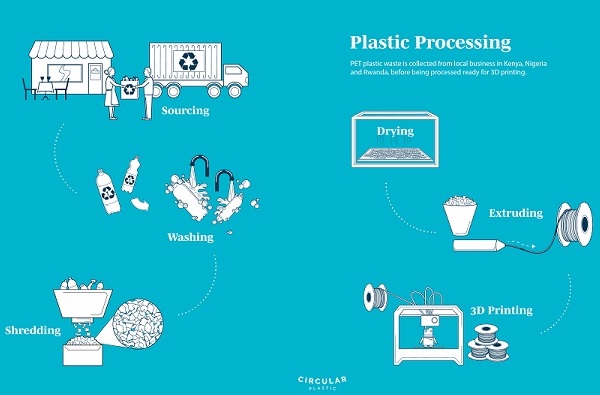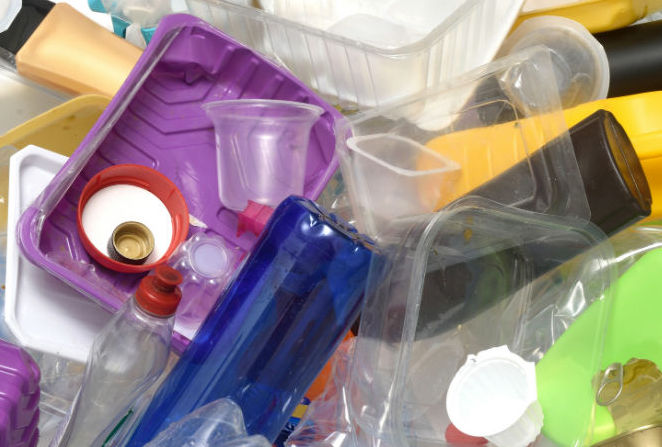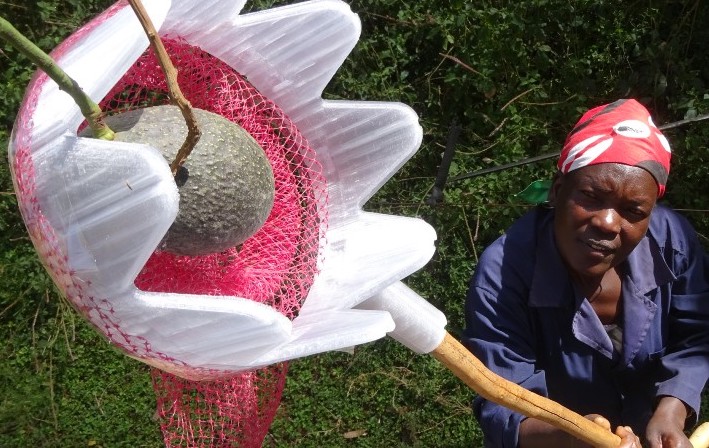Researchers at the UK’s Loughborough University have managed to turn polymeric refuse collected on the African continent into low-cost agricultural tools for local farmers there.
Working as part of the ‘Circular Plastics Project,’ the team has recycled discarded bottles into a processable filament, before 3D printing it into six circular farming implements. According to their designers, these contraptions, which range from a fruit picker to a fish farming system, could help those in developing countries to not only boost their economies, but reduce their local build-up of plastic waste.
“Low-to-middle income countries have largely been excluded from the benefits of innovative polymer products that make tasks easier, cleaner and safer due to high manufacturing costs,” said Mark Evans of Loughborough Design School. “The project has effectively turned this on its head with the step-change benefit of using locally-sourced waste materials in their cost-effective manufacture.”

Loughborough’s circularity goals
The Loughborough team’s Circular Plastics Project is closely related to two larger initiatives: the Perpetual Plastic for Food to Go project (PPFTG), and the Smart Sustainable Plastic Packaging Challenge (SSPP). Backed by the UK government’s UK Research and Innovation (UKRI) agency, the SSPP has been set up to help identify new ways of reducing the amount of pollution caused by plastic packaging.
Within this wider £8 million program, Loughborough University has been awarded £1.15 million to fund the PPFTG project, through which it’s aiming to use ‘smart technologies’ to address the world’s waste issues. In particular, when the initiative was green-lit last year, the team set their sights on creating a ‘circular business model,’ capable of reducing the eco-impact of so-called ‘food-to-go’ packaging.
“Fresh and chilled foods such as sandwiches and prepared salads sold by food retailers, generates significant single-use plastic packaging waste,” Project Lead Garrath Wilson explained last year. “Our project will bring together academics with expertise in packaging technology, user behaviour, sustainable design, manufacturing and polymer chemistry, to eliminate food-to-go waste.”

The Circular Plastics Project
In keeping with the PPFTG program’s aims, the Loughborough team has now received a further £150,000 in funding from the Engineering and Physical Sciences Research Council. Using this grant, the department’s researchers have worked with colleagues at Aston University and De Montfort University, in an attempt to turn plastics into goods for African businesses as part of the Circular Plastics Project.
Thus far, in the eighteen-month initiative, the team of designers and engineers have collaborated with a UK NGO and partners in Kenya, Rwanda and Nigeria to collect plastic water bottles. Once accumulated, the researchers washed, shredded, dried and extruded this waste into a usable filament, before 3D printing it into tools that are designed to address the specific needs of different African communities.
Although the project remains ongoing, the team have come up with six initial prototypes, including a modular fish farm and fruit grabber, that can be built from local netting and bamboo materials. The researchers are also developing novel sand dredging adaptors, non-electric milk coolers and machete peelers, as well as a recycled boat baler that’s capable of using wave motion to pump water.
Already, the project has been nominated in the Social Impact category of the Industrial Designers Society of America’s annual International Design Excellence Awards, but with the program set to run until December 31, 2021, Evans remains focused on the potential of its business model for supporting local African farming, fishing and construction firms.
“[Our] process makes the recycling of waste plastic water bottles an attractive economic proposition by converting it into filament for 3D printing,” adds Evans. “By integrating this with industrial design methods, the capacity to 3D print complex forms without the need for tooling, enables the manufacture of niche products that would not typically be viable.”

AM in the developing world
As highlighted by the Loughborough team, the benefits of adopting advanced technologies like 3D printing have often been reserved for those living in the western world, but now both private and state-backed firms are working to change this.
Just last year, 14Trees revealed that it would be 3D printing affordable, low-carbon housing and schools in Africa, with the aim of tackling the continent’s infrastructure shortage. Using an ink developed by LafargeHolcim, the project team is attempting to rapidly additive manufacture houses in Malawi, before extending construction into Kenya and Zimbabwe.
At around the same time, University of Cambridge spin-out Blue Tap announced that it was developing a 3D printed chlorine doser, that can be used to make water safe to drink in low-income countries. Backed by Innovate UK, the device has already been fitted to a test rig in Uganda, where Blue Tap also sells chlorine injectors to local plumbers.
Elsewhere, U.S. charities such as LifeEnabled are using 3D printing to improve the accessibility of prosthetics to amputees in the developing world. For at least four years now, the organization has run a clinic in the Guatemalan city of San Benito, where it offers to 3D print and CNC mill free prosthetic limbs for the local population.
To stay up to date with the latest 3D printing news, don’t forget to subscribe to the 3D Printing Industry newsletter or follow us on Twitter or liking our page on Facebook.
For a deeper dive into additive manufacturing, you can now subscribe to our Youtube channel, featuring discussion, debriefs, and shots of 3D printing in-action.
Are you looking for a job in the additive manufacturing industry? Visit 3D Printing Jobs for a selection of roles in the industry.
Featured image shows the Loughborough team’s 3D printed ‘fruit grabber.’ Photo via Loughborough University.



